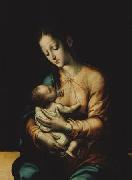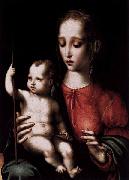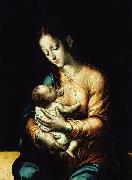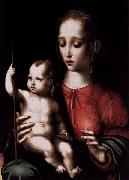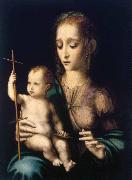Luis de Morales Oil Painting ReproductionAll Luis de Morales Oil Paintings(1510 - 9 May 1586) was a Spanish painter born in Badajoz, Extremadura. Known as "El Divino", most of his work was of religious subjects, including many representations of the Madonna and Child and the Passion. Influenced, especially in his early work, by Raphael Sanzio and the Lombard school of Leonardo, he was called by his contemporaries "The Divine Morales", because of his skill and the shocking realism of his paintings, and because of the spirituality transmitted by all his work. His work has been divided by critics into two periods, an early stage under the influence of Florentine artists such as Michelangelo and a more intense, more anatomically correct later period similar to German and Flemish renaissance painters |
|||

|
|||
|
|
|||
|
||||||||
| Luis de Morales (1510 - 9 May 1586) was a Spanish painter born in Badajoz, Extremadura. Known as "El Divino", most of his work was of religious subjects, including many representations of the Madonna and Child and the Passion. Influenced, especially in his early work, by Raphael Sanzio and the Lombard school of Leonardo, he was called by his contemporaries "The Divine Morales", because of his skill and the shocking realism of his paintings, and because of the spirituality transmitted by all his work. His work has been divided by critics into two periods, an early stage under the influence of Florentine artists such as Michelangelo and a more intense, more anatomically correct later period similar to German and Flemish renaissance painters |
||||||||
|
|
||||||||
| Gemälde IDENTIFIZIERUNG:: 81321 Virgin and Child Date from 1560(1560) until 1570(1570) Medium Oil on canvas Dimensions 85 x 64 cm (33.5 x 25.2 in) cjr |
||||||||
|
|
||||||||
| Gemälde IDENTIFIZIERUNG:: 81573 Virgin and Child with a Spindle Date between 1567(1567) and 1569(1569) Medium Oil on oak Dimensions Height: 49 cm (19.3 in). Width: 33 cm (13 in). cjr |
||||||||
|
|
||||||||
| Gemälde IDENTIFIZIERUNG:: 85354 Virgin and Child from 1560(1560) until 1570(1570) Medium Oil on canvas Dimensions 85 x 64 cm (33.5 x 25.2 in) cyf |
||||||||
|
|
||||||||
| Gemälde IDENTIFIZIERUNG:: 85594 Virgin and Child with a Spindle between 1567(1567) and 1569(1569) Medium Oil on oak cyf |
||||||||
|
|
||||||||
| Gemälde IDENTIFIZIERUNG:: 96673 Madonna with the Child 1570s Medium oil on panel cyf |
||||||||
|
|
||||||||
| VORHERIGER KÜNSTLER NÄCHSTER KÜNSTLER | ||||||||
|
|
||||||||
|
Luis de Morales (1510 - 9 May 1586) was a Spanish painter born in Badajoz, Extremadura. Known as "El Divino", most of his work was of religious subjects, including many representations of the Madonna and Child and the Passion. Influenced, especially in his early work, by Raphael Sanzio and the Lombard school of Leonardo, he was called by his contemporaries "The Divine Morales", because of his skill and the shocking realism of his paintings, and because of the spirituality transmitted by all his work. His work has been divided by critics into two periods, an early stage under the influence of Florentine artists such as Michelangelo and a more intense, more anatomically correct later period similar to German and Flemish renaissance painters |
||||||||
|
|
||||||||
|
KONTAKTIEREN Sie UNS |





